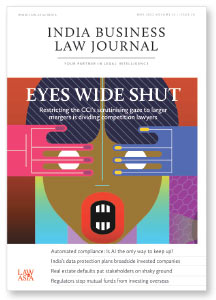Enduring challenges amid a perfect storm
The country is in the midst of grappling with unfavourable circumstances such as high unemployment and high inflation. Together these can potentially become as disruptive as the pandemic, but also not helping the economy is the steep rise of crude oil prices and other essential commodities due to the war in Ukraine. India meets 85% of its oil needs from imports.
The government can alleviate some of these challenges through a greater commitment to the ease of doing business. Unfortunately, it’s favoured way of demonstrating results – the World Bank’s Doing Business Report – was discontinued last year after internal reviews found improper data changes. While the government will have to locate another trusted and globally respected source of information to certify an improved business environment, the mantra of ease of doing business will remain in its lexicon.

India Business Law Journal
Until then, the government can continue to work on cutting through the red tape, shortening lengthy regulatory approvals, and removing jail sentences for lesser offences. With all of these, word of mouth remains a powerful source of conveying improvements to the rest of the world.
Our Cover story looks at one of these important initiatives to reduce regulatory approval times and further the cause of ease of doing business. With the de minimis exemption extended to 2027, M&A transactions within lower thresholds continue to be exempted from the competition authority’s review. However, this continuing strategy has also divided opinions among legal experts.
Proponents say the exemption benefits companies and the regulator, as these concern small deal sizes unlikely to affect the competition landscape for the given sector. But critics say this lets larger entities take over smaller competitors, eliminating future competition. Opinions on possible solutions and the way forward remain divided, and our story also looks at how other regulators in Asia have handled this.
In the Briefing, mutual funds have had their wings clipped after the capital markets regulator asked them to hold off on fresh overseas investment. The advisory was in response to funds breaching the USD8 billion cap for the industry. Although India’s foreign reserves have grown to around USD600 billion – double what it was in 2008 – the regulator has chosen to adopt a cautious approach. Mutual funds are anxiously waiting for the restriction to be lifted, as this limits their investment choices, but the scenario is unlikely to change in the current economic environment.
In Shaky ground, we explore the trouble that has been brewing in the real estate sector, and the experiences of creditors and homeowners trying to get what they are due. The National Company Law Tribunal (NCLT) recently initiated insolvency proceedings against real estate major Supertech and renowned construction group Logix.
Prior to this, large real estate firms such as HDIL, Jaypee Infratech, Amrapali group and Unitech group have also faced defaults, bringing uncertainty for stakeholders. Our article finds that the corporate insolvency resolution process is a long and arduous one, and that an absence of timely resolutions may discourage future investment.
In Vantage point , we look at the road ahead for the country’s much anticipated data protection bill. Late last year, a joint parliamentary committee delivered a comprehensive 462-page report on the bill after two years of deliberation. However, in its current form the bill places onerous requirements in areas such as data localisation, imposes restrictions on “critical” data transfers, and requires data protection officers to be domiciled in India. If concerns are not sufficiently addressed, it may prompt the departure of existing players and set barriers for new entrants.
In Comply with AI, we look at why compliance processes at companies can benefit from being automated. Indian regulations often change regularly and failure to keep up can result in penalties and legal action. The market already has many tech-based options that do away with the need to hire multiple employees to oversee the processes. In this regard, compliance officers can better invest their time into actioning the insights derived from the automated software, staying on top of current regulations and enhancing the company’s performance.
Our most keenly awaited feature, the Indian Law Firm Awards, returns again to shine a light on the achievements and ingenuity of the country’s top law firms. As lawyers returned to their pre-pandemic routines, M&A and PE deals were closed in record numbers. Amid this flurry of activity, India Business Law Journal’s editorial team examined thousands of nominations and endorsements to select the year’s winners.
AZB & Partners once again wins the top award of Law Firm of the Year, in addition to winning in other prominent practice areas such as Banking & finance, Capital markets, and Competition & antitrust among others.
IndusLaw secured a place in the Best Overall Law Firms category after being included for the first time last year. The law firm has inducted more equity partners in the past year, bringing the total to 17. This means that the firm has little trouble attracting legal talent. It also wins another nine practice area awards, which is a remarkable feat. The awards celebrate the talent and excellence among India’s legal community and the winning teams should be justifiably proud.



























